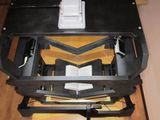Bookscanner: Difference between revisions
(→Links) |
|||
| Line 103: | Line 103: | ||
=== http://diybookscanner.eu === | === http://diybookscanner.eu === | ||
[[File:DIYBOOKSCANNEREU-Front.jpg|160px]] | [[File:DIYBOOKSCANNEREU-Front.jpg|160px]] | ||
https://github.com/markvdb/diybookscanner/wiki General wiki | |||
Revision as of 12:49, 20 February 2018
Timeline
2009
In 2009, Daniel Reetz published a tutorial on how to make a book scanner from cheap cameras and trash. His initial tutorial touched off a firestorm of interest and launched this community (http://diybookscanner.org).
2012
Mark van den Borre establishes diybookscanners.eu. It is a for-profit spinoff of his involvement in the DIYbookscanner.org community. diybookscanners.eu sells book scanners, both as a kit and preassembled.
2015
In 2015, Daniel retired from the project, but the community (http://diybookscanner.org) lives on. We are still producing new designs and new software. Step by step we are making it easier for anyone around the world to produce high quality scans of the history they hold most dear.
http://diybookscanner.org
https://github.com/DIYBookScanner/spreadpi
Latest commit 656374c on May 26, 2015
People
Daniel Reetz
Ivo Ielitis
Mark van den Borre
Hardware
- Essential scanner demo: VIDEO of Mark Van den Borre demoing the system
- Assembly manual (Mark Van Den Borre EU edition) https://github.com/markvdb/diybookscanner.eu/blob/master/mechanical_assembly.md
- Design of parts of the scanner
- Assembly manual: Archivist Scanner by Daniel Reetz http://diybookscanner.org/archivist/
- Scanner Kit Assembly: Archivist Guide by Tenrec Builders http://tenrec.builders/archivist-guide.html
Software
Canon PowerShot electronical triggering script
https://github.com/markvdb/diybookscanner/blob/master/misc/test_keypedal.sh
Openscad porting work
https://github.com/markvdb/diybookscanner/tree/master/openscad (in progress)
CHDK
- CHDK is firmware for canon cameras
- https://github.com/markvdb/diybookscanner/blob/master/misc/settings.md
- ptpcam debian packaging (work in progress)
Spreads
spreads is a tool that aims to streamline your book scanning workflow. It takes care of every step: Setting up your capturing devices, handling the capturing process, downloading the images to your machine, post-processing them and finally assembling a variety of output formats.
Along the way you can always fine-tune the auto-generated results either by supplying arguments or changing the configuration beforehand, or by inspecting the output and applying your modifications.
spreads is meant to be fully customizable. This means, adding support for new devices is made as painless as possible. You can also hook into any of the spread commands by implementing one of the available plugin hooks or even implement your own custom sub-commands.
http://diybookscanner.org/archivist/indexee7f.html... older version of readthedocs
spreads is a tool that aims to streamline your book scanning workflow. It takes care of every step: Setting up your capturing devices, handling the capturing process, downloading the images to your machine, post-processing them and finally assembling a variety of output formats.
http://diybookscanner.org/archivist/indexee7f.html?page_id=846
Before reading this page, please keep in mind that it is necessarily out-of-date.
Installing spreads: https://pypi.python.org/pypi/spreads
SpreadPi
Raspberry Pi image tailored for running a DIYBookScanner with the spreads software suite.
Backup Image from our diybookscanner
Feb 2018: We made a backup image of the pi as delivered from Mark vdb...
http://pzwart1.wdka.hro.nl/~aroidl/scannerpi.img.xz
Quotations
It's hard to build things without a manual. (Natasha)
Five years ago we built our first book scanner from salvage and scrap. Book digitization was the domain of giants — Microsoft and Google. Commercial book scanners cost as much as a small car. Unless you chose to destroy your books in sheet-feed or flatbed scanners, there was no safe and affordable way to preserve the contents of your bookshelf on your e-reader. Collectively, we tried to fix that. Over 2,000 people contributed more than 350 designs and thousands of lines of code at diybookscanner.org. The result is the Archivist — the VW Beetle of book scanners — cheap, durable, and tremendously effective. It’s open source and made with the simplest materials possible, like plywood, bungees, and skateboard bearings (Daniel Reetz)
Links
http://diybookscanner.org/
http://diybookscanner.org/
Jonathon Duerig and Scann
http://lusis.eu/ company of Marc
http://diybookscanner.eu
https://github.com/markvdb/diybookscanner/wiki General wiki



